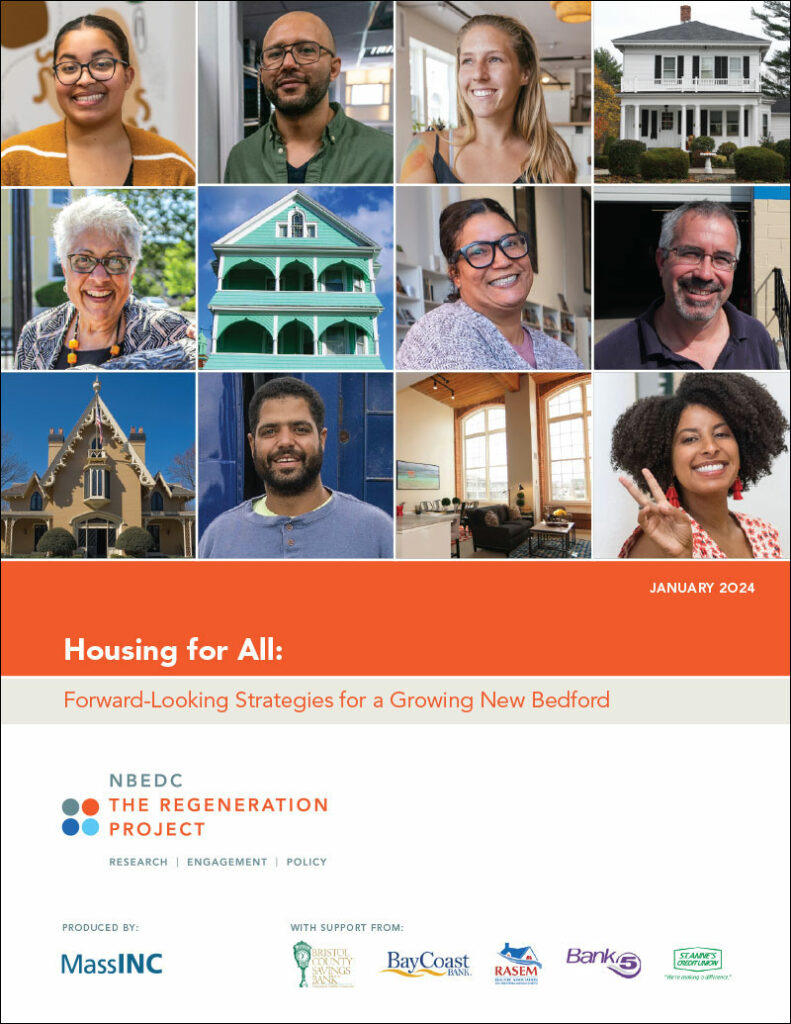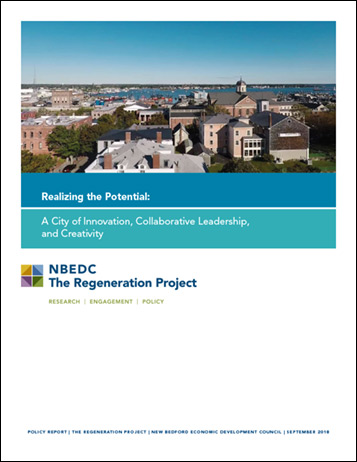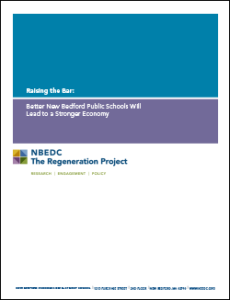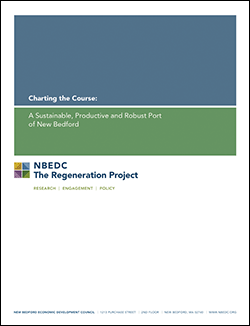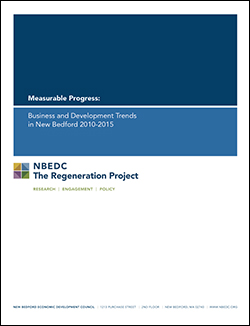
The Regeneration Project is a collaborative platform that allows for a broad cross section of private sector community leaders to shape, advocate, and tangibly advance a strategy of sustainable and shared growth for New Bedford.
Why We Do It
What began as a group coming together to respond to a short- term call to action by Mayor Mitchell in 2014 is now a place where some of our most complex city building challenges are brought to the table for thoughtful discussion, debate, and strong advocacy by a diverse collection of private sector community leaders. All issues and matters discussed and put forward into the public square help in answering an overarching question—“what does it take to advance the sustainable regeneration of New Bedford’s economy?”
How it Works
The first strategy recommendation of the Regeneration Committee’s 2014 report is titled “Organizing for Success”. Within this section is the recommended action of developing a cross-sector leadership group to focus on the development of long-term goals and policy by adding a new arm to an existing organization such as the NBEDC. In 2015, the NBEDC Board agreed to take on this work in the form of a standing committee as allowed under the NBEDC by-laws. The Project is staffed by the NBEDC team for its day-to-day activities and utilizes the work of senior fellows and other partners for the development of white papers and comprehensive reports. The Project is not an extension of City government, but is rather a partner and resource to elected and appointed officials.
Who is at the Table
The membership of the Regeneration Committee is comprised of 42 community leaders that represent the private, non-profit, and higher education sectors of the economy. The diverse membership includes top executives from regionally headquartered firms including CEO’s of multi-national corporations, leaders of educational institutions, owners of small and medium-sized enterprises, and artists and entrepreneurs. Specifically, the group draws membership from the financial services sector, the offshore wind sector, advanced manufacturing, maritime industries, the healthcare sector, the media, secondary and post-secondary education, training and advocacy institutions, charitable foundations, and the arts.
Many of these organizations invest deeply in the community through charitable donations, grants and scholarships, and countless service projects. The combined impact of these industrial leaders exceeds $1 Billion in annual revenue and represents more than 15,000 jobs throughout Greater New Bedford.
Our Work
The foundation of the Regeneration Project is relevant data gained from sound and balanced research. The NBEDC partners with UMass Dartmouth, MassINC and other content experts to conduct topic research, bench-mark New Bedford with other similar communities, and craft policy based on the committee’s work.
The committee publishes policy statements that can serve as a resource in the early stages of development of an economic asset for the purpose of greater long-term positive impact to the community. Certain issue sets that require greater depth of study are commissioned to provide the appropriate depth of knowledge to advance a particular issue or set of issues with local and regional political leaders.
The work done by this group is intended to a be highly valuable resource for the Board of Directors of the NBEDC, local and state agencies, Mayor and City Council of New Bedford, federal and state delegations, and the general public.
REPORTS
Housing for All: Forward-Looking Strategies for a Growing New Bedford (2024)
Throughout Massachusetts and across the country, housing costs have become a formidable problem. This is true for Greater New Bedford as well, but the city and its citizens are no strangers to meeting seemingly intractable challenges. Acting collaboratively and with steady determination, the city can and will find ways to not just meet its housing needs but to go beyond, with a response that leads to a stronger, more inclusive, and productive economy. HOUSING FOR ALL is intended to help all stakeholders find the way.
The in-depth analysis presented in this report was produced by MassINC. Their mission is to make Massachusetts a place of civic vitality and inclusive economic opportunity by providing residents with the nonpartisan research, reporting, analysis, and civic engagement necessary to understand policy choices, inform decision-making, and hold the government accountable. This report was made possible only with the financial support from Bristol County Savings Bank, BayCoast Bank, Bank Five, St. Anne’s Credit Union, and the Realtor Association of Southeastern Massachusetts.
The practical solutions offered in the report focus on:
- Land Assembly
- Homeownership
- Gap Financing
- Capacity Building
Realizing the Potential: A City of Innovation, Collaborative Leadership, and Creativity (2018)
Through an eight-month comprehensive process including sub-committee meetings, interviews, surveys, and roundtable discussions with subject matter experts, this strategic report was developed to identify actions that the private and public sector can take together to amplify the regeneration of the City.
Inspiration for this report began with the publication of Revitalizing America’s Smaller Legacy Cities, co-authored by Torey Hollingsworth and Alison Goebel of the Greater Ohio Policy Center, and published by the Lincoln Institute of Land Policy. Ben Forman of MassINC and Colleen Dawicki of the Working Cities Challenge at the Federal Reserve Bank of Boston also provided insights, guidance, and support throughout the process. Throughout the pages of this report, the committee makes the case that New Bedford can be:
- A global leader in the ocean cluster development, research, and entrepreneurship
- A metropolitan anchor for the region with a vibrant and diverse downtown and waterfront experience
- A place where emerging community leadership is recruited and harnessed
- A city that uses art, design, and architecture to inspire citizens and visitors
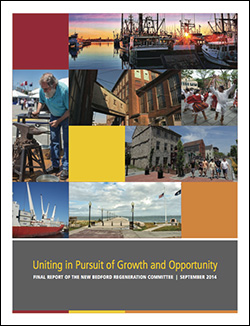
Uniting in Pursuit of Growth and Opportunity (2016)
The committee’s first report pulls inspiration from “Regenerating America’s Legacy Cities”, a report from the Lincoln Institute of Land Policy that suggests regional cities like New Bedford succeed when cross-sector leaders develop, adopt, and steadfastly pursue a shared vision.
The committee convened as both a full body and in smaller working groups throughout the spring and summer to develop the report, in collaboration with MassINC and the Urban Initiative at UMass Dartmouth; the committee’s deliberations were informed by presentations from subject-area experts and interviews with local leaders.
The Final Report of the Committee presents concrete strategies divided into four sections:
- Organizing and sustaining New Bedford economic development activities
- Furthering the regeneration of Downtown New Bedford
- Growing the Port of New Bedford
- Growing advanced manufacturing industries.
WHITE PAPERS
Raising the Bar: Better New Bedford Public Schools Will Lead to a Stronger Economy (2016)
The true cornerstone to building a strong and resilient economy is the education and skill level of New Bedford families. This paper focuses on the educational attainment level of the community, how it directly relates to the workforce readiness of our citizens, and what steps need to be taken to move our community in the right direction. Short-term and long-term strategies designed to create a positive impact are outlined.
Charting the Course: A Sustainable, Productive and Robust Port of New Bedford (2016)
For the City’s port growth to reach its full potential, land-use, infrastructure, and port management will need to reach an appropriate level of sophistication. Underpinning the importance of this effort are the game-changing gains in private sector investment and job creation that the port has the opportunity to generate for the city, region and the Commonwealth of Massachusetts. In this paper, a unified authority model and next steps to achieve such goals are discussed.
Measurable Progress: Business and Development Trends in New Bedford 2010-2015 (2016)
Through qualitative and quantitative data, this report examines the sense of sustained economic growth executed in 2010-2015 by implementing the ten-year economic development strategy put forth by Mayor Mitchell and the Regeneration Committee. While much work lies ahead, the results display signs of real momentum and strength toward achieving the City’s shared vision of a vibrant seaport community.
Letters & OP-EDS
Support for Infill Development at 278 Union Street, Letter to City of New Bedford, Planning (2021) The Committee shares their full support for the infill housing project at 278 Union Street, known as 10 @ 8th, as proposed by Alinea Capital Partners, LLC. The Committee notes that project can help drive local, sustainable, and equitable economic growth in New Bedford, by cultivating a vibrant, diverse, and unique downtown experience.
ARPA Process and Investments in New Bedford, Letter to Mayor Mitchell (2021) The Committee lays out a strategy for public outreach and deployment of the $64,729,754 in ARPA funds that have been designated for New Bedford by the U.S. Treasury Department, based upon their four “Big Ideas.” The strategy discusses early and robust public engagement, as well as immediate, short-term, and long-term investments for consideration.
Waterways License Application, New Bedford Port Authority, Letter to DEP (2021) The Committee outlines that DEP regulations allow for Supporting Uses in DPAs and explain the importance of the small, local restaurant’s presence at Pier 3.
Zeiterion Capital Improvement Project in Downtown New Bedford, Letter to Secretary Kennealy (2021) The Committee underscores the economic value of not only the Z’s place in our community, but the value this project will have on New Bedford’s economic recovery in this letter.
In Support of Sensible Development at the New Bedford Golf Course (2021) As a group of community leaders whose priority is to promote sustainable and transformative economic development, the Committee applauds the efforts of the City Council and Mayor Mitchell in taking the first tangible steps to advance long talked about plans to redevelop a portion of the municipal golf course for new commercial development. The op-ed outlines the importance of the 100-acre Advanced Manufacturing Campus.
Moby Dick and 117 Union Street Development Project Letter to DHCD (2020) As a part of their previous report, the Committee advocates for the pursuit of smaller-scaled housing developments with a focus on key infill parcels as a means to bolster the market and attract new residents interested in an urban lifestyle. The letter makes the case that both projects do just that, and their advancement can help the city emerge with a downtown that is stronger in a post-COVID-19 pandemic world.
COVID-19: Proposed Principles for Economic Mitigation, Recovery, and Expansion, Letter to Mayor Mitchell (2020) In response to the Mayor’s request for the Regeneration Committee’s insight, an outline of best practices and recommendations was developed. The committee encourages the re-opening of New Bedford businesses in all industries safely and as quickly as possible, and equally focuses on policies and actions that can strengthen our local impacts on global issues such as food insecurity, domestic manufacturing of critical supply chain products, equitable and high-speed connectivity, and housing needs for homeowners and renters at all income levels.
Fairness and Regional Equity are Essential for Community Wellness (2019)
To create systematic change in the health of our community we need strong local institutions with top- rated professionals, facilities, and programs in place. Southcoast Health is just such an institution and St. Luke’s Hospital has been a cornerstone of our city for generations. In this op-ed piece, the committee outlines their concerns about BCBSMA’s decision to potentially terminate their contract with Southcoast Health.
Home Rule Petition (HD4174), Letter to Representative Cabral (2019)
The success of the more than 13,000 school children being educated in our city is vital to New Bedford’s future economic success. In this letter, the committee urges Representative Cabral to support the voices of New Bedford’s elected leaders and their partners by passing HD4174 in the House and the Senate.
South Coast Rail Phase 1 Project Funding, Letter to Governor Baker (2019)
For the first time in decades, our community can begin to realize the fruits of the labor put forth and see the reality of the South Coast Rail project. In this letter, the committee asks Governor Baker for his support in fully funding Phase I.
Your View: Excellence in all schools requires reforms to funding and approach (2019)
Public education is the cornerstone of our citizens’ ability to be economically successful, healthier, and generally more positively engaged in the greater good of the community. In this op-ed piece, the committee takes the stand that the current funding mechanism for our schools is both ineffective and insufficient. Short-term and long-term steps to resolve this local and state-wide dilemma are discussed.
Public Education Funding and the Impacts on New Bedford, Letter to Governor Baker (2018)
The issues related to excellence in public education cities such as New Bedford has been at the forefront of the committee’s thinking. In this letter to Governor Baker, the committee discussed the current status of the district and the impact of adding additional charter school seats.
Comments Regarding the Offshore Wind 83C Solicitation, Letter to Governor Baker (2018)
Because of the leadership and hard work of many, we firmly believe that New Bedford and this region of the Commonwealth will become the central cluster of offshore wind for the east coast that includes all major facets of the industry such as port services, construction, training, research, engineering, and manufacturing. Industrial-scale offshore wind must be developed in such a way that it “fits in” to the already strong and vibrant life of the port of New Bedford and the nation’s commercial fishing industry. In this letter to Governor Baker, the committee outlined major points of concern and consideration in the 83C selection process
Deepwater’s Revolution Wind Proposal for 83D Solicitation, Letter to Secretary Beaton (2017)
For nearly a decade, the City of New Bedford built public awareness about the economic, environmental, and social benefits associated with offshore wind production. In this letter to Secretary Beacon, the committee expressed their support for the “Revolution Wind” proposal by Deepwater Wind, as a part of the 83D solicitation.
A Team Mindset for New Bedford’s Schools (2017)
After publishing their whitepaper, Raising the Bar: Better New Bedford Public Schools Will Lead to a Stronger Economy, the fourth in a series of policy statements about how we can encourage dynamic and sustainable economic growth for a thriving New Bedford, the committee followed up with this op-ed. The whitepaper examined ways of furthering the progress and sustaining efforts in the turnaround plan supported by the School Committee. The op-ed notes the critical role played by the School Committee in shepherding the district’s continued improvement.
Your View: Grow or Risk Sliding Backward (2017)
As business and civic leaders in the community, the committee outlined their support and logic for the concept of a second business park being established on a portion of the New Bedford Municipal Golf Course.
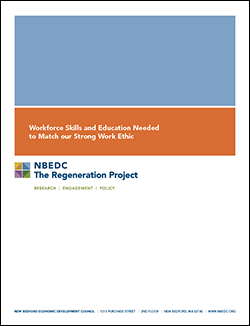 Workforce Skills and Education Needed to Match our Strong Work Ethic (2017)
Workforce Skills and Education Needed to Match our Strong Work Ethic (2017)
Building a highly skilled and well-educated workforce is a hard thing for any community to do and it does not happen overnight, no matter how strong their work ethic. When education and workforce training levels are so closely tied to crime, physical health, and so much more, it is imperative that actions be taken by the community to create change. Stakeholder agencies and organizations can help to develop momentum by executing strategies outlined.
Port of New Bedford Policy Statement—Charting the Course, Letter to Secretary Jay Ash (2016)
Following the release of their report, Uniting in Pursuit of Growth and Opportunity, the committee wrote to Jay Ash to underscore one of the main strategies for our long-term economic growth, the modernization of the Port of New Bedford/Fairhaven. The letter supports the MassDevelopment management proposal submitted by Mayor Mitchell.
Support for the New Bedford 2016 TIGER Grant Proposal, Letter to Secretary Foxx (2016)
Throughout the history of the city, the harbor has always been New Bedford’s greatest asset, and it still holds much potential for further development. In this letter to Secretary Foxx, the committee outlines their support of the New Bedford Harbor Development Commission’s (HDC) proposal to the 2016 TIGER funding opportunity, provided by the US Department of Transportation.
Partners & Resources
The MassINC Gateway Cities Innovation Institute
The institute played a key role in the early work of the Regeneration Project. The Gateway Cities Innovation Institute leverages MassINC’s research, polling, and policy team to strengthen connections across communities and helps Gateway City leaders develop and advance a shared policy agenda. We are a proud participant in their efforts and find the MassINC research and policy work an invaluable resource for our work in New Bedford.
Working Cities Challenge
The Working Cities Challenge (WCC) Initiative is a grant competition designed to advance collaborative leadership in smaller, postindustrial cities to transform the lives of their low-income residents. Launched in 2013, the competition benefits many resurgent communities in Massachusetts, Rhode Island, and Connecticut. Research from the Boston Fed found economic resurgence in smaller cities results from the ability of leaders to collaborate across sectors around a long-term vision for success.
Greater Ohio Policy Center
Greater Ohio Policy Center (GOPC) is a non-profit, non-partisan organization with a mission to improve Ohio’s communities through smart growth strategies and research. In their vision to revitalize Ohio, they undertake original research and analysis, develop pragmatic policy recommendations and advocacy strategies, and deploy our convening power to meet the needs of Ohio’s local change-makers.
Co-Chairs
Anthony Sapienza
President, NBEDC
Maureen Sylvia Armstrong
President, CEO and Owner Sylvia Group Insurance
Members
Sarah Athanas
Co-Founder & Owner, Groundwork!
Cheryl Bartlett
CEO, Greater New Bedford Community Center
Anne Broholm
CEO, AHEAD, LLC
Lauren Burm
Head of Public Affairs, Ørsted North America
Richard Canastra
Owner, Whaling City Seafood Display Auction
Paul Chasse
CEO, Realtor Association of Southeastern Massachusetts
Nicholas Christ
President & CEO, BayCoast Bank
Adam Cove
CEO, Edson International
Dr. Laura Douglas
President, Bristol Community College
Jennifer Downing
Executive Director, Leadership SouthCoast
Doug Glassman
Owner, SERVPRO of Dartmouth/New Bedford
Jeff Glassman
President, Darnit! Inc.
Rosemary Gill
Executive Director, Zeiterion Performing Arts Center
Dena Haden
Program Manager, Co-Creative Center
Keith Hovan
President & CEO, Southcoast Health System
Helena DaSilva Hughes
Executive Director, Immigrants’ Assistance Center
Elizabeth Isherwood
Chairman, Greater New Bedford Industrial Foundation
Dr. Robert Johnson
Chancellor, UMass Dartmouth
Gerry Kavanaugh
CEO, LStar Capital
Rick Kidder
President & CEO, SouthCoast Chamber of Commerce
Jim McKeag
TDI Fellow – Fall River, MassDevelopment
Amanda McMullen
President & CEO, New Bedford Whaling Museum
Matt Morrissey
Vice President Deepwater Wind
Peter Muise
President & CEO, First Citizens’ Federal Credit Union
Patrick Murray
President & CEO, Bristol County Savings Bank
Joseph Nauman
Former Executive Vice President, Corporate and Legal Acushnet Company
James O’Brien
Superintendent, GNBVT High School
Beth Perdue
Editor, SouthCoast Media Group
Christopher Rezendes
Founder & President INEX Advisors
Quentin Ricciardi
CEO Acorn Management
Maria Rosario
Executive Director, NorthStar Learning Centers
David Slutz
Managing Director Potentia Business Solutions
Bob Unger
Chairman, Leadership SouthCoast
John Vasconcellos
President, Community Foundation of SE MA
David Wechsler
President and CEO, Maritime International

